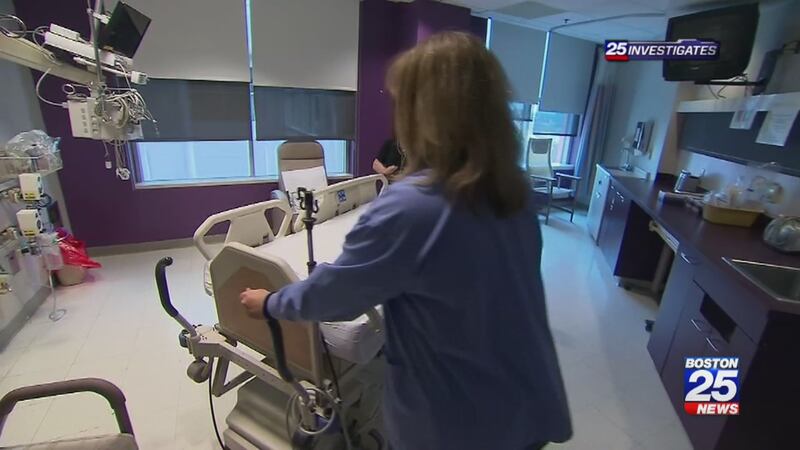BOSTON — Massachusetts Emergency Room nurses are increasingly under attack, facing physical and verbal abuse at the hands of patients who are high on opiates.
Sixty-nine percent of local nurses say they have been assaulted in some form by their patients in the past two years, according to a 2018 survey by the Massachusetts Nurses Association (MNA), the union that represents nurses and health professionals in state.
25 Investigates found a recent change to the law related to police encounters with incapacitated persons may be contributing to the uptick in violence against Emergency Department workers.
In 2016, a section of the state’s protective custody statute was amended to include language on how police must handle the treatment of individuals incapacitated by controlled substances.
“Any person who is incapacitated may be placed into protective custody by a police officer without the person's consent for the purpose of immediately transporting the person to an acute care hospital or satellite emergency facility as defined in section 51 1/2 of chapter 111 or otherwise immediately obtaining appropriate emergency medical treatment,” reads the statute.
That change means police are bringing more patients to emergency rooms instead of jails and leaving ER staff exposed to patients who range from belligerent to violent.
25 Investigates’ Kerry Kavanaugh spoke to one who works at Beth Israel Deaconess Plymouth’s Emergency department about an incident over Thanksgiving weekend that highlights the problem.
Through tears, the nurse - who requested anonymity out of fear of retribution - recounted the violent incident, which occurred after the intoxicated patient was dropped off at the ER by Kingston police.
“As he walked in his arms were crossed, showing all the signs that he did not want to be there. We could already anticipate that he was going to be an issue,” she recalled. “One of our ER techs goes in and said we are going to do vitals and he had stated in a belligerent way ‘You are not FN going to do vitals on me. Don't touch me. I want to see a doctor.’"
According to the nurse, the patient grew increasingly agitated, belligerent and aggressive, prompting the head nurse to call security.
“He just stood at the door and he goes ‘If I don't get FN out of here I'm going to kill everyone here,’" she recalled, becoming emotional during the interview. “He came and he went to punch one of (the guards) and both security officers tackled him and as they are trying to get him into the room so they could put him into the bed. One of the officers got pinned into the wall. He was getting choked by his walkie that was around his neck and he was yelling to another nurse 'pull that off my chest, pull it off my chest.’”
Police were called in to assist. Ultimately, it took nine hospital staff members and police to restrain him. Despite being restrained, the intoxicated patient continued to abuse ER staff, calling them names, using racial slurs and even spitting at them.
“One of our technicians had gone over to reach over his arms so he didn't hit somebody else. He elbowed her, hit her in the eye, causing her to have a black eye and a bloody nose,” she recounted, adding that she now is frightened to go to work. “Everyone was traumatized by what happened with that patient.”
Incidents like this one occur every day in Emergency Departments across the state, according the MNA, which says hospitals need to do more to improve staff safety.
Between Thanksgiving and Christmas alone, seven attacks on ER nurses were reported, including incidents at St. Vincent Hospital and UMass Memorial Medical Center in Worcester, according to the MNA.
Nationally, attacks on nurses are on the rise too. According to data from the U.S. Bureau of Labor Statistics, 1223 attacks on nurses were reported in 2016, that up from the 960 reported in 2015.
"We are bringing (intoxicated individuals) to the hospital far more frequently than we did before but that's the way the statute goes,” said James Hurley, retired chief of the Leicester Police Department, who supports providing medical attention to individuals who are battling drug addiction. "We are not going to arrest our way out of the opioid epidemic. That concept has long past. We need to get these individuals medical help."
But nurses say that if they going to be forced into the frontline of the opioid epidemic, hospitals must to a better job of protecting them.
"We are asking our hospital nurses to do psych nursing. Asking our hospital nurses to do detox, asking people to practice outside of their scope of practice," said Christine Pontus, associate director of health and safety at the MNA. "I'm not saying don't give them treatment. I'm saying give them what they need but take them out of the patient mix take them out and have a crew ready for them."
In a statement to 25 Investigates, the Massachusetts Health & Hospital Association said safety is a priority: "Incidents of violence in healthcare workplaces remain a deep and serious concern, and all hospitals are doing what they can to ensure safety across the board."
But the nurses’ union is pushing for standardized safety protocols across all hospitals, better training and a buffer between intoxicated patients who could be potentially violent and the rest of the hospital population.
Later this month, MNA plans to once again file legislation to get hospitals to commit to certain safety measures, including standardized response plans and training.
In a statement, Beth Israel Deaconess Plymouth said they are “always evaluating public safety” and when needed work with local police “to assist in the event of immediate harm to a patient, staff or visitors.”
Cox Media Group







